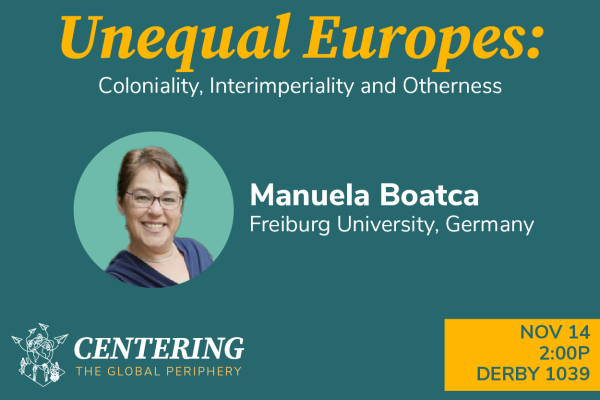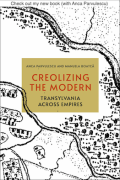
In most postcolonial literature, the assumption that a region is either a post-colony of the West or it has not been colonized is either implicitly or explicitly present. Focusing instead on the history and present of the unequal Europes brought about by the constant tension between Habsburg, Ottoman, Austro-Hungarian and Russian empires in Europe helps correct this assumption. This presentation aims to show how this shift of focus highlights the dialectical role of vying empires before as well as after Western European hegemony. To this end, it zooms in on the inter-imperial history of one of Europe’s most undertheorized regions, Transylvania, in order to argue that the coloniality that gradually engulfed the world after 1492 constituted a late moment in a larger inter-imperial configuration of power that predated the emergence of Western Atlantic expansion and vied with it.
Speaker
Manuela Boatca is Professor of Sociology with a focus on social structure and globalization and Head of School of the Global Studies Program at the University of Freiburg. She was a visiting professor at IUPERJ, Rio de Janeiro, from 2007 to 2008, and professor for the sociology of global inequalities at Freie Universität Berlin from 2012 to 2015. Her publications include Global Inequalities Beyond Occidentalism (Routledge, 2016) and Decolonizing European Sociology: Transdisciplinary Approaches (co-edited with E. Gutiérrez Rodríguez and S. Costa; Ashgate, 2010). Her work focuses on world-systems analysis, postcolonial and decolonial perspectives, gender in modernity/coloniality, racialization, and the geopolitics of knowledge in Europes and the Americas.
Book: Creolizing the Modern

How are modernity, coloniality, and interimperiality entangled? Bridging the humanities and social sciences, Anca Parvulescu and Manuela Boatca provide innovative decolonial perspectives that aim to creolize modernity and the modern world-system. Historical Transylvania, at the intersection of the Habsburg Empire, the Ottoman Empire, Austria-Hungary, and Russia, offers the platform for their multi-level reading of the main themes in Liviu Rebreanu's 1920 novel Ion. Topics range from the question of the region's capitalist integration to antisemitism and the enslavement of Roma to multilingualism, gender relations, and religion. Creolizing the Modern develops a comparative method for engaging with areas of the world that have inherited multiple, conflicting imperial and anti-imperial histories
Purchase Creolizing the Modern by Anca Purvulescu and Manuela Boatca
